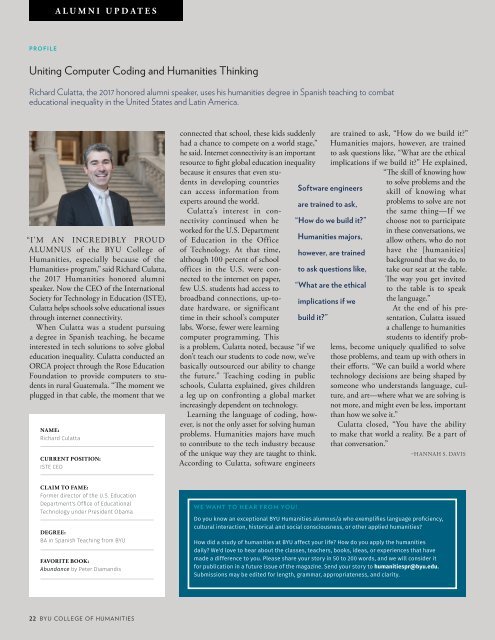Fall 2017
You also want an ePaper? Increase the reach of your titles
YUMPU automatically turns print PDFs into web optimized ePapers that Google loves.
ALUMNI UPDATES<br />
PROFILE<br />
Uniting Computer Coding and Humanities Thinking<br />
Richard Culatta, the <strong>2017</strong> honored alumni speaker, uses his humanities degree in Spanish teaching to combat<br />
educational inequality in the United States and Latin America.<br />
“I’M AN INCREDIBLY PROUD<br />
ALUMNUS of the BYU College of<br />
Humanities, especially because of the<br />
Humanities+ program,” said Richard Culatta,<br />
the <strong>2017</strong> Humanities honored alumni<br />
speaker. Now the CEO of the International<br />
Society for Technology in Education (ISTE),<br />
Culatta helps schools solve educational issues<br />
through internet connectivity.<br />
When Culatta was a student pursuing<br />
a degree in Spanish teaching, he became<br />
interested in tech solutions to solve global<br />
education inequality. Culatta conducted an<br />
ORCA project through the Rose Education<br />
Foundation to provide computers to students<br />
in rural Guatemala. “The moment we<br />
plugged in that cable, the moment that we<br />
NAME:<br />
Richard Culatta<br />
CURRENT POSITION:<br />
ISTE CEO<br />
connected that school, these kids suddenly<br />
had a chance to compete on a world stage,”<br />
he said. Internet connectivity is an important<br />
resource to fight global education inequality<br />
because it ensures that even students<br />
in developing countries<br />
can access information from<br />
experts around the world.<br />
Culatta’s interest in connectivity<br />
continued when he<br />
worked for the U.S. Department<br />
of Education in the Office<br />
of Technology. At that time,<br />
although 100 percent of school<br />
offices in the U.S. were connected<br />
to the internet on paper,<br />
few U.S. students had access to<br />
broadband connections, up-todate<br />
hardware, or significant<br />
time in their school’s computer<br />
labs. Worse, fewer were learning<br />
computer programming. This<br />
is a problem, Culatta noted, because “if we<br />
don’t teach our students to code now, we’ve<br />
basically outsourced our ability to change<br />
the future.” Teaching coding in public<br />
schools, Culatta explained, gives children<br />
a leg up on confronting a global market<br />
increasingly dependent on technology.<br />
Learning the language of coding, however,<br />
is not the only asset for solving human<br />
problems. Humanities majors have much<br />
to contribute to the tech industry because<br />
of the unique way they are taught to think.<br />
According to Culatta, software engineers<br />
are trained to ask, “How do we build it?”<br />
Humanities majors, however, are trained<br />
to ask questions like, “What are the ethical<br />
implications if we build it?” He explained,<br />
“The skill of knowing how<br />
to solve problems and the<br />
skill of knowing what<br />
problems to solve are not<br />
the same thing—If we<br />
choose not to participate<br />
in these conversations, we<br />
allow others, who do not<br />
have the [humanities]<br />
background that we do, to<br />
take our seat at the table.<br />
The way you get invited<br />
to the table is to speak<br />
the language.”<br />
At the end of his presentation,<br />
Culatta issued<br />
a challenge to humanities<br />
students to identify problems,<br />
become uniquely qualified to solve<br />
those problems, and team up with others in<br />
their efforts. “We can build a world where<br />
technology decisions are being shaped by<br />
someone who understands language, culture,<br />
and art—where what we are solving is<br />
not more, and might even be less, important<br />
than how we solve it.”<br />
Culatta closed, “You have the ability<br />
to make that world a reality. Be a part of<br />
that conversation.”<br />
Software engineers<br />
are trained to ask,<br />
“How do we build it?”<br />
Humanities majors,<br />
however, are trained<br />
to ask questions like,<br />
“What are the ethical<br />
implications if we<br />
build it?”<br />
–HANNAH S. DAVIS<br />
CLAIM TO FAME:<br />
Former director of the U.S. Education<br />
Department's Office of Educational<br />
Technology under President Obama<br />
DEGREE:<br />
BA in Spanish Teaching from BYU<br />
FAVORITE BOOK:<br />
Abundance by Peter Diamandis<br />
WE WANT TO HEAR FROM YOU!<br />
Do you know an exceptional BYU Humanities alumnus/a who exemplifies language proficiency,<br />
cultural interaction, historical and social consciousness, or other applied humanities?<br />
How did a study of humanities at BYU affect your life? How do you apply the humanities<br />
daily? We'd love to hear about the classes, teachers, books, ideas, or experiences that have<br />
made a difference to you. Please share your story in 50 to 200 words, and we will consider it<br />
for publication in a future issue of the magazine. Send your story to humanitiespr@byu.edu.<br />
Submissions may be edited for length, grammar, appropriateness, and clarity.<br />
22 BYU COLLEGE OF HUMANITIES


